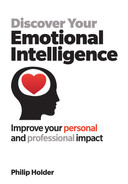Foreword

In 2016, the World Economic Forum forecast that emotional intelligence (EI) would be one of the top 10 skills employees would need in the future workplace. That forecast was based on the then growing interest in EI by both business commentators and academics.
Since then, an ever-increasing body of research has provided robust evidence for the value of EI, and few people would now deny that the forecast by the World Economic Forum was accurate.
In a world that is now full of more significant uncertainty than at any time since the Second World War, the ability to express and manage our emotions is fundamental to success, and so is our ability to understand and respond appropriately to the emotions of others.
We humans are, almost certainly, the most emotionally regulated creatures on earth. We all can modify emotional reactions and experiences through an internal process of emotional regulation. At times, these skills require effort, and at other times they appear automatic.
It is important to remember, however, that a considerable amount of our brain contributes to that emotional regulation. Emotions also strongly influence physical reactions. They change body chemistry according to whether the emotions are positive or negative. We can work to improve our EI by taking advantage of our brain’s own physical ability to change.
From a strict business perspective, managing emotions may appear trivial and a ‘touchy-feely’ soft skill divorced from reality. However, businesses are built on people and, if people can communicate effectively, relate to each other positively, manage change successfully and collaborate willingly, they are more likely to succeed.
The foundation to building EI is a sense of emotional awareness, of being smart about what we feel. Scientists refer to this as ‘meta-mood’ – a term for a person’s reflective, introspective mental experience of their ongoing mood states, such as sorrow, anger, joy or embarrassment.
For those who do not find academic texts the most stimulating way to learn, this book by Philip Holder will be a very welcome opportunity to grasp the theory and importance of EI.
Now, at a time when the world is in a period of unprecedented upheaval and anxiety, the need for emotional intelligence has never been greater. There are many models of EI available in the marketplace, each one with its own set of characteristics. As a result, the range of choices can appear bewildering to those who are newcomers to the subject.
Fortunately, Philip Holder’s book provides readers with an opportunity to use the Personal Emotional Intelligence Profile (PEIP), free of charge. This assessment is essential because understanding our EI characteristics is a significant first step in becoming more aware and in helping us to identify areas for further emotional improvement.
The good news from all of this is that, unlike IQ, EI is highly malleable. As we ‘train’ our brain by repeatedly and correctly applying new emotionally intelligent behaviours, it builds the pathways necessary to convert those behaviours into habits. As the brain reinforces the use of the new behaviours, the emotional hooks supporting old, counter-productive behaviours diminish. As a result, the brain begins responding to its surroundings with enhanced EI without us even having to think about it.
Emotional intelligence is a skill that goes beyond industries, professions, cultures and situations because it is always applicable. Developing EI is an ongoing journey – a journey that differs from person to person. Nonetheless, this book will help you map a suitable route to follow and will make the journey a rewarding experience.
By Colin T. Wallace, PhD
The Center For Applied Neuroscience, Delaware, USA
